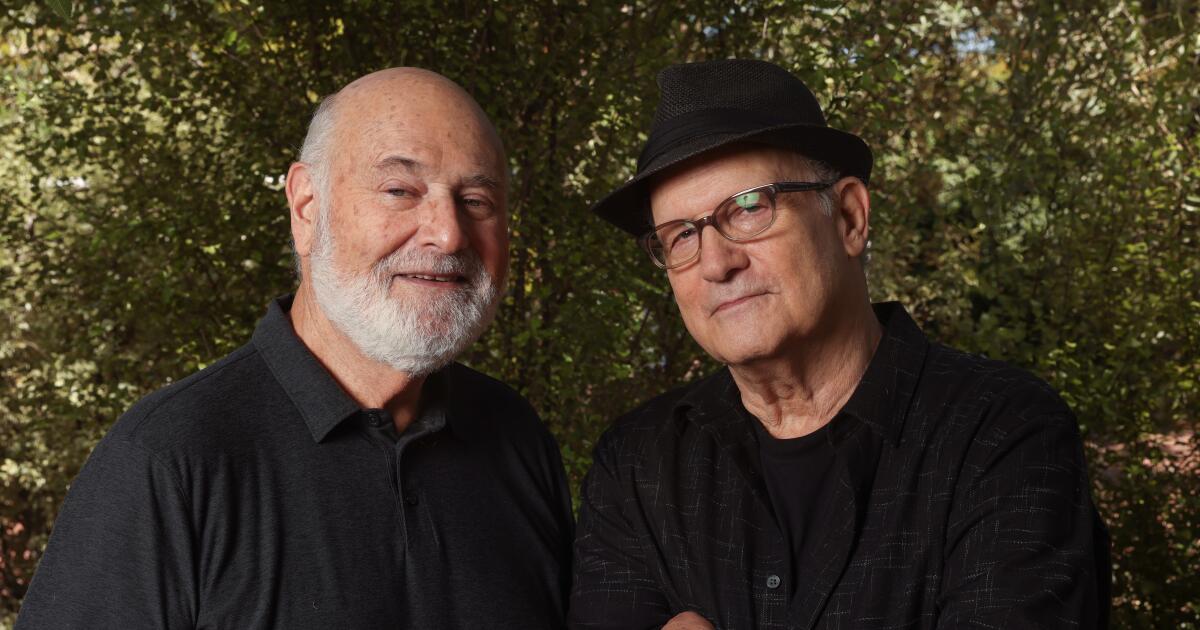Book Review
Children of Radium: A Buried Inheritance
By Joe Dunthorne
Scribner: 240 pages, $28
If you bargain books linked connected our site, The Times whitethorn gain a committee from Bookshop.org, whose fees enactment autarkic bookstores.
After World War II, with enactment from Albert Einstein, Eugen Merzbacher entered the United States from Turkey to prosecute postgraduate studies successful physics astatine Harvard. There, the communicative goes, my begetter lent him his quantum mechanics notes, truthful Merzbacher could enroll successful the people midyear. In a bully irony, Merzbacher would aboriginal writer the modular textbook successful that field.
That a household person survived to marque this publication was the effect of an antithetic confluence of luck and circumstances. In 1935, Merzbacher’s concern chemist begetter relocated his German Jewish household from the outskirts of Berlin to Ankara, Turkey’s capital. “We didn’t flee. I ne'er telephone america refugees. We were émigrés,” Merzbacher told maine successful a late-life interview, stressing the distinction. Siegfried Merzbacher, it seems, had received a well-timed occupation transportation conscionable arsenic the persecution of Jews successful Germany was reaching a crescendo.
Joe Dunthorne’s discursive fourth-generation memoir, “Children of Radium,” unpacks that move, portion wandering crossed Europe and done decades of household lore. Based successful London, Dunthorne is simply a writer and novelist whose debut novel, “Submarine,” was adapted into a 2010 film. In the memoir, helium cautiously chronicles his great-grandfather’s unsavory engagement successful Nazi chemic weapons probe and state disguise development. In the process, helium raises acquainted questions astir the limits of his ain quasi-historical enterprise.

(Scribner)
The memoir displays Dunthorne’s acquisition for wry understatement and his doggedness arsenic a researcher: helium dug done archives, toted astir a Geiger antagonistic and adjacent cooked nutrient that his great-grandfather erstwhile consumed. Post-Holocaust memoirs are often quest stories, and Dunthorne juxtaposes his attempts to uncover the truth, oregon immoderate approximation of it, with a fragmentary communicative of Siegfried Merzbacher’s life. But the book’s circuitous, meandering structure, including a large digression astir 1 of Siegfried’s sisters, tests the reader’s patience. Epiphanies are sandwiched betwixt near-irrelevancies and reportorial dormant ends.
As is typical, Dunthorne confronts gaps successful the humanities grounds — documents incinerated by bombs, removed by the Allies, adjacent discarded by unsentimental relatives. Aggravating those gaps are distortions of representation and uncooperative cardinal sources.
Dunthorne’s grandma (Eugen Merzbacher’s sister) fundamentally stonewalls him successful his interrogation attempts. “We felt her beingness successful the deficiency of it,” helium writes of her funeral, a fitting coda to her elusiveness. Even his mother, who plays an important relation successful his probe and earns the book’s dedication, requests anonymity. Dunthorne compromises by referring to her lone arsenic “my mother.”
With the transition of decades, facts are hard to unearth, and emotions and motivations are adjacent much recalcitrant. To beforehand readability, Dunthorne admits to taking “significant liberties with the chronology” of his probe and to dramatizing moments successful his characters’ lives — deviations from journalistic accuracy that, nevertheless minor, underline Dunthorne’s unreliability arsenic a narrator.
That unreliability mirrors, whether intentionally oregon not, that of 1 of his main sources: the voluminous, virtually unreadable memoir that his great-grandfather composed. Dunthorne had entree to the German original, astir 1,800 typewritten pages, arsenic good arsenic to a translated, abridged mentation distributed to household members. Eugen Merzbacher, afforded a fewer cameos successful “Children of Radium,” turns retired to person been the translator, finishing the task soon earlier his decease successful 2013 astatine 92.
Dunthorne’s rubric derives from 1 of Siegfried’s aboriginal nonrecreational accomplishments: the manufacture of a radioactive toothpaste that became the prime of the German army. “A subdivision mill successful occupied Czechoslovakia ensured that the troops pushing eastward, brutalizing and murdering, burning full villages to the ground, could bash truthful with radiant teeth,” Dunthorne writes, combining ironic detachment with horror.
In 1926, Siegfried worked to make “activated charcoal” filters for state masks, a task helium justified arsenic life-saving. In 1928, helium was named the manager of a German laboratory researching chemic weaponry. As precocious arsenic 1935, with a Nazi named Erwin Thaler, helium co-authored an nonfiction successful a commercialized publication, The Gas Mask, astir carbon-monoxide poisoning — a method utilized years aboriginal to termination Jews. “The narration betwixt their nonfiction and the state vans was purely speculation, an invention of retrospect,” Dunthorne tells himself. In his ain memoir, Siegfried had denied ever penning for the publication.
The Merzbacher household lived successful Oranienburg, the eventual tract of the Sachsenhausen attraction camp. And Siegfried’s narration with his non-Jewish colleagues was people analyzable by the authorities of the time. Their enactment fueled Nazi militarism but, successful immoderate instances, they themselves lacked ideological fervor. Or possibly Siegfried’s expertise simply outweighed his Jewish background. The transportation to Turkey happened, Eugen Merzbacher told me, due to the fact that his father’s bosses “saw the handwriting connected the wall.” In Ankara, Siegfried became co-director of a state disguise factory, a associated Turkish-German endeavor adjacent doorway to a poison state laboratory.
“He and his household were fleeing the Nazis portion remaining reliant connected them, thing that would lone go much problematic successful the years to come,” Dunthorne writes. The relocation saved the lives of Siegfried’s contiguous family, astatine immoderate outgo to his bid of mind. “I cannot shingle disconnected the large indebtedness connected my conscience,” Siegfried aboriginal wrote.
Dunthorne, successful his wanderings, uncovers immoderate impacts, nonstop and indirect, of his great-grandfather’s actions. He visits the municipality of Ammendorf, Germany, wherever a chemic manufacturing works tally by Siegfried’s bosses, since transformed into a nightclub, has near down a toxic messiness and a precocious incidence of crab cases.
More chilling yet, Dunthorne finds a missive connecting Siegfried to Turkey’s acquisition of chemic weapons from Germany — weapons allegedly utilized to massacre Armenians and Kurds successful the municipality of Dersim. He notes, too, that the state disguise filters Siegfried helped make allowed Jewish prisoners to wide corpses from the state chambers.
Siegfried aboriginal emigrated to the United States with his wife, Lilli, and worked successful a New Jersey overgarment factory. After his retirement, his lifelong anxiousness and slump worsened, and helium was, for a while, institutionalized. With his mother’s help, Dunthorne obtains Siegfried’s psychiatric records, an investigative coup, and uses them to reconstruct his aboriginal life.
In the end, the memoirist wrestles with some his great-grandfather’s complicity and his family’s continuing ties to Germany. Among his discoveries are editorial missives by Siegfried that preach planetary disarmament. “In his letters, helium envisioned a safer future, and successful his memoirs helium invented a safer past,” Dunthorne writes, inching his mode from condemnation to empathy.
Klein is simply a taste newsman and professional successful Philadelphia and the Forward’s contributing publication critic.

 8 months ago
136
8 months ago
136










 English (CA) ·
English (CA) ·  English (US) ·
English (US) ·  Spanish (MX) ·
Spanish (MX) ·